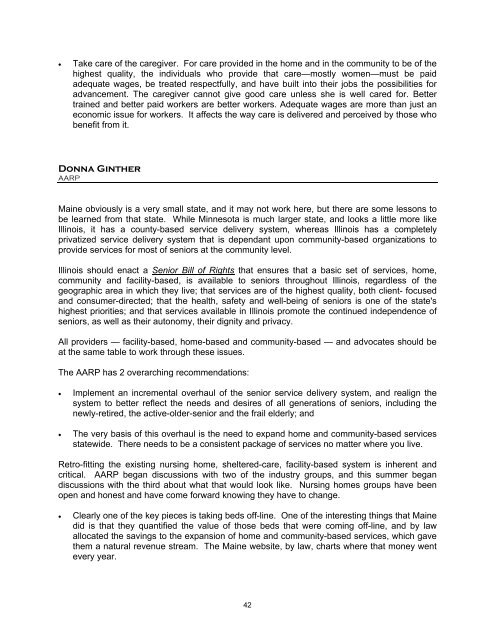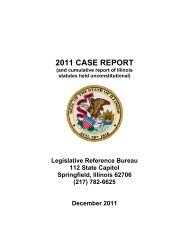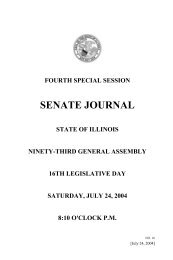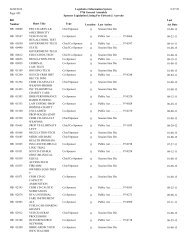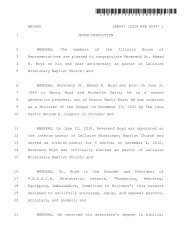Long-Term Care - Illinois General Assembly
Long-Term Care - Illinois General Assembly
Long-Term Care - Illinois General Assembly
Create successful ePaper yourself
Turn your PDF publications into a flip-book with our unique Google optimized e-Paper software.
• Take care of the caregiver. For care provided in the home and in the community to be of the<br />
highest quality, the individuals who provide that care—mostly women—must be paid<br />
adequate wages, be treated respectfully, and have built into their jobs the possibilities for<br />
advancement. The caregiver cannot give good care unless she is well cared for. Better<br />
trained and better paid workers are better workers. Adequate wages are more than just an<br />
economic issue for workers. It affects the way care is delivered and perceived by those who<br />
benefit from it.<br />
Donna Ginther<br />
AARP<br />
Maine obviously is a very small state, and it may not work here, but there are some lessons to<br />
be learned from that state. While Minnesota is much larger state, and looks a little more like<br />
<strong>Illinois</strong>, it has a county-based service delivery system, whereas <strong>Illinois</strong> has a completely<br />
privatized service delivery system that is dependant upon community-based organizations to<br />
provide services for most of seniors at the community level.<br />
<strong>Illinois</strong> should enact a Senior Bill of Rights that ensures that a basic set of services, home,<br />
community and facility-based, is available to seniors throughout <strong>Illinois</strong>, regardless of the<br />
geographic area in which they live; that services are of the highest quality, both client- focused<br />
and consumer-directed; that the health, safety and well-being of seniors is one of the state's<br />
highest priorities; and that services available in <strong>Illinois</strong> promote the continued independence of<br />
seniors, as well as their autonomy, their dignity and privacy.<br />
All providers — facility-based, home-based and community-based — and advocates should be<br />
at the same table to work through these issues.<br />
The AARP has 2 overarching recommendations:<br />
• Implement an incremental overhaul of the senior service delivery system, and realign the<br />
system to better reflect the needs and desires of all generations of seniors, including the<br />
newly-retired, the active-older-senior and the frail elderly; and<br />
• The very basis of this overhaul is the need to expand home and community-based services<br />
statewide. There needs to be a consistent package of services no matter where you live.<br />
Retro-fitting the existing nursing home, sheltered-care, facility-based system is inherent and<br />
critical. AARP began discussions with two of the industry groups, and this summer began<br />
discussions with the third about what that would look like. Nursing homes groups have been<br />
open and honest and have come forward knowing they have to change.<br />
• Clearly one of the key pieces is taking beds off-line. One of the interesting things that Maine<br />
did is that they quantified the value of those beds that were coming off-line, and by law<br />
allocated the savings to the expansion of home and community-based services, which gave<br />
them a natural revenue stream. The Maine website, by law, charts where that money went<br />
every year.<br />
42


